This page contains affiliate links. Please read our disclosure for more info.
We travelled to Iceland in September and it turned out to be one of the best times to visit Iceland.
We had fewer crowds and lower prices than in the summer and got to see the magical northern lights and beautiful autumn colours.
In this post, I share what to expect when visiting Iceland in September including the weather, road conditions, what to wear, things to do, and the pros and cons of travel at this time of year.
At the end, there is a handy map with everything mentioned.
Contents
- Key Facts About Visiting Iceland in September
- Our September Iceland Itinerary
- Daylight Hours in Iceland in September
- Can You See the Northern Lights in Iceland in September?
- Weather in Iceland in September
- What to Wear in Iceland in September
- Road Conditions and Closures
- Reduced Crowds
- Opening Hours
- Wildlife in September
- Things to Do in Iceland in September
- Visiting Iceland in September Map
- Is September a Good Time to Visit Iceland?
- More Iceland Tips
Key Facts About Visiting Iceland in September
- There are 12 to 14 hours of daylight.
- You can see the northern lights.
- The weather is beginning to feel wintery. We had temperatures of –2ºC (28ºF) to 5ºC (40ºF).
- Roads are usually clear of snow (except in the uninhabited highlands), but you may see some snow starting to fall on the mountains.
- You can snowmobile (and see lots of snow) on the glaciers.
- It’s less crowded and cheaper than in the summer.
- It’s fall/autumn in Iceland and parts of the country have trees and vegetation that turn beautiful shades of orange and red. There aren’t a huge amount of trees so you won’t see this everywhere.
- Some museums, cafes, and activities in remote areas are closed.
- It’s not the best time to see whales and puffins, but we did spot many seals.
Don’t forget to buy travel insurance for your Iceland trip and make sure it covers Covid-19.
An excellent budget option is SafetyWing (kids under 10 are free). If you want cancellation cover as well, check out Heymondo.
Our September Iceland Itinerary
Our 12-day road trip in September focused on the western side of the island including the stunning Snæfellsnes Peninsula and remote Westfjords.
See our Iceland itinerary for more details on where we went and stayed.
Daylight Hours in Iceland in September
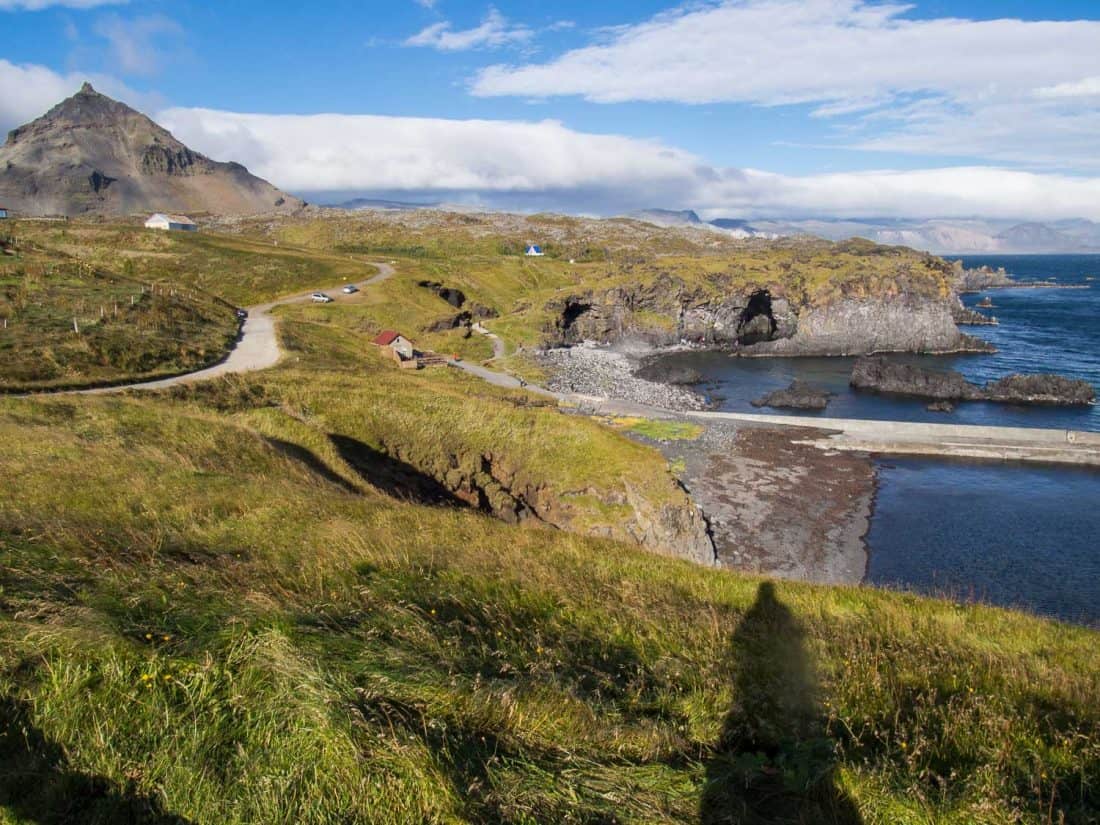
The amount of daylight in Iceland varies widely depending on the time of year you visit.
In the summer the sun barely sets, but in the winter it only rises for a few hours a day.
While both of these seasons would be interesting to experience, visiting in September is more practical for touring as you have around 12 to 14 hours of daylight.
This gives you plenty of time for exploring during the day, you can see sunrise and sunset at reasonable times, and you won’t be kept awake by the midnight sun.
Daylight hours reduce fairly rapidly during the month. In Reykjavik at the very beginning of September, the sun rises at around 6.15am to 6.30am and sets from 8.45pm to 8.30pm giving 14 to 14.5 hours of daylight.
By the end of the month, the sun rises from 7 am to 7.30am and sets from 7.30pm to 7 pm with 12 to 12.5 hours of daylight.
In the far north daylight hours will be slightly longer.
The autumnal equinox takes place in September when the length of day and night is nearly equal. In 2024 and 2025, the equinox will be on 22 September.
One of the things we loved about Iceland was how gorgeous the light is.
Even in the middle of the day the glowing light made it feel like a permanent golden hour. It’s fantastic for photography.
Can You See the Northern Lights in Iceland in September?
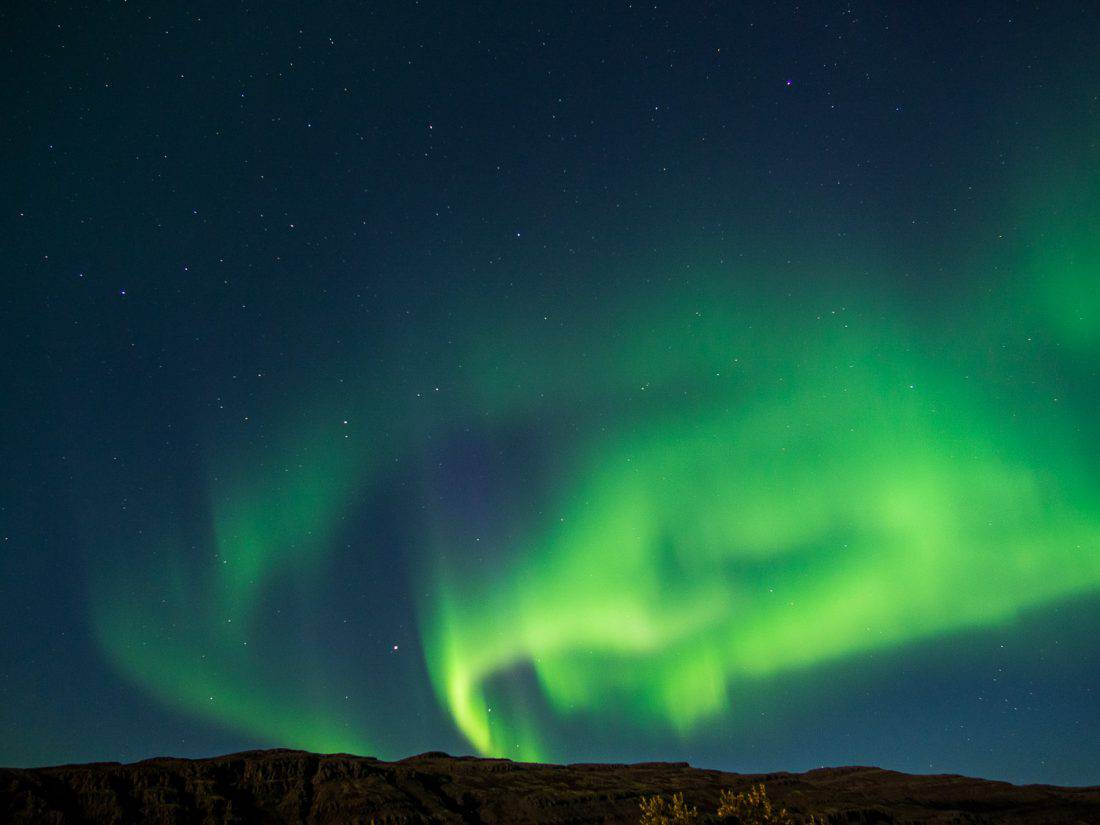
Yes! One of the best reasons for visiting Iceland in September is the chance to see the northern lights (aurora borealis).
They only appear from September to mid-April, and you’ll have a better chance towards the end of September, especially around the equinox (although there were sightings at the end of August this year).
There are no guarantees that you’ll see the aurora borealis at any time of year. We used the Aurora app and Vedur website to check our chances of seeing the lights each day.
You need cloud-free, dark skies away from light pollution, so I recommend spending at least a few nights away from a town.
You can also take a Northern Lights tour from Reykjavik, but it’s not necessary if you’ve rented a car.
We saw the northern lights outside our cabin at Bjarkarholt Guesthouse in the southern Westfjords the day before the equinox and it was stunning!
Weather in Iceland in September
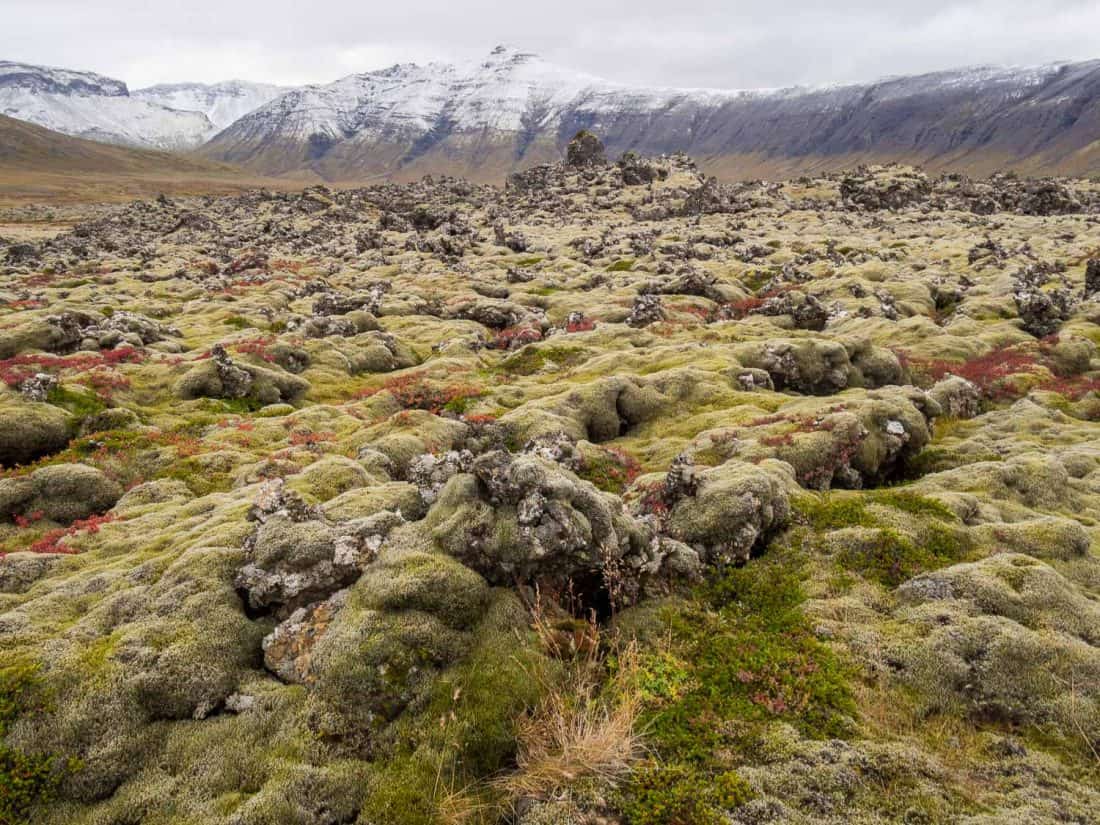
We visited Iceland in late September and the weather was distinctly wintery—it felt more like England in January.
We had temperatures ranging from –2ºC (28ºF) at night to 5ºC (40ºF) during the day.
It can be warmer than we experienced with the average maximum 11ºC (53ºF) and the minimum 6ºC (44ºF), but the wind-chill factor can make it feel cooler.
In 12 days we had a mix of sunny and cloudy days with two days of heavy rain that we used as an excuse for much-needed days off. The wind was often powerful.
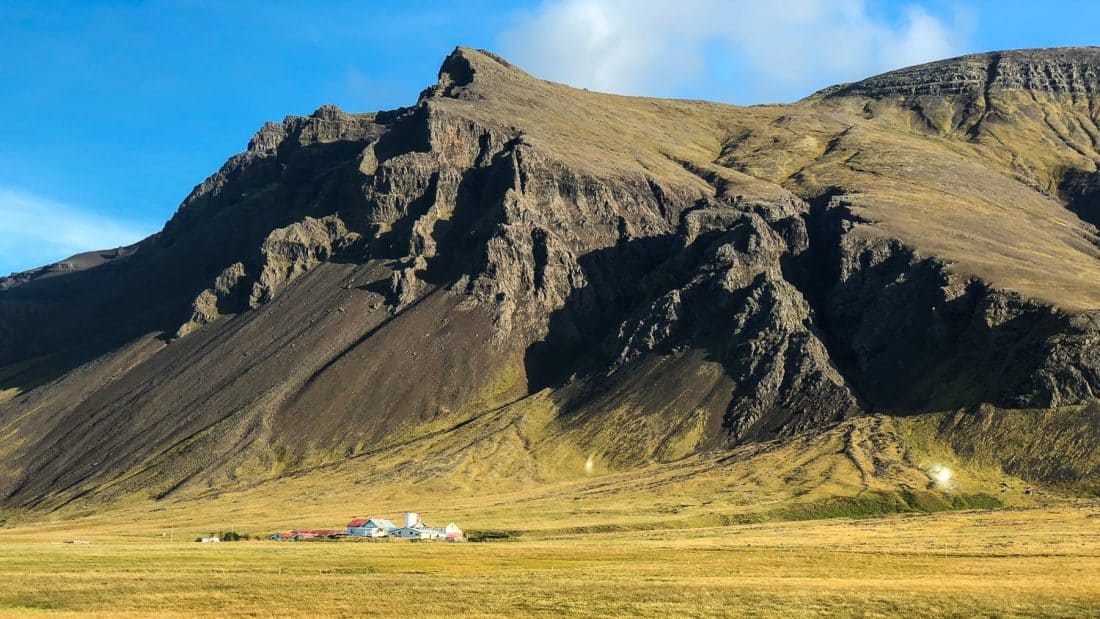
We packed plenty of layers and it never felt too cold to explore. Even in the summer, you can’t guarantee good weather—it’s notoriously unpredictable.
The great thing about September was that we got to see the first snow appearing on the mountains.
One morning we woke in our cabin at Tradir Guesthouse (now closed) on the Snæfellsnes Peninsula and the mountain next to it was covered in snow.
We also drove through a few snow showers on mountain passes in the Westfjords.
Weather changes fast in Iceland, so it’s important to check the Vedur website or app for weather forecasts during your trip.
What to Wear in Iceland in September
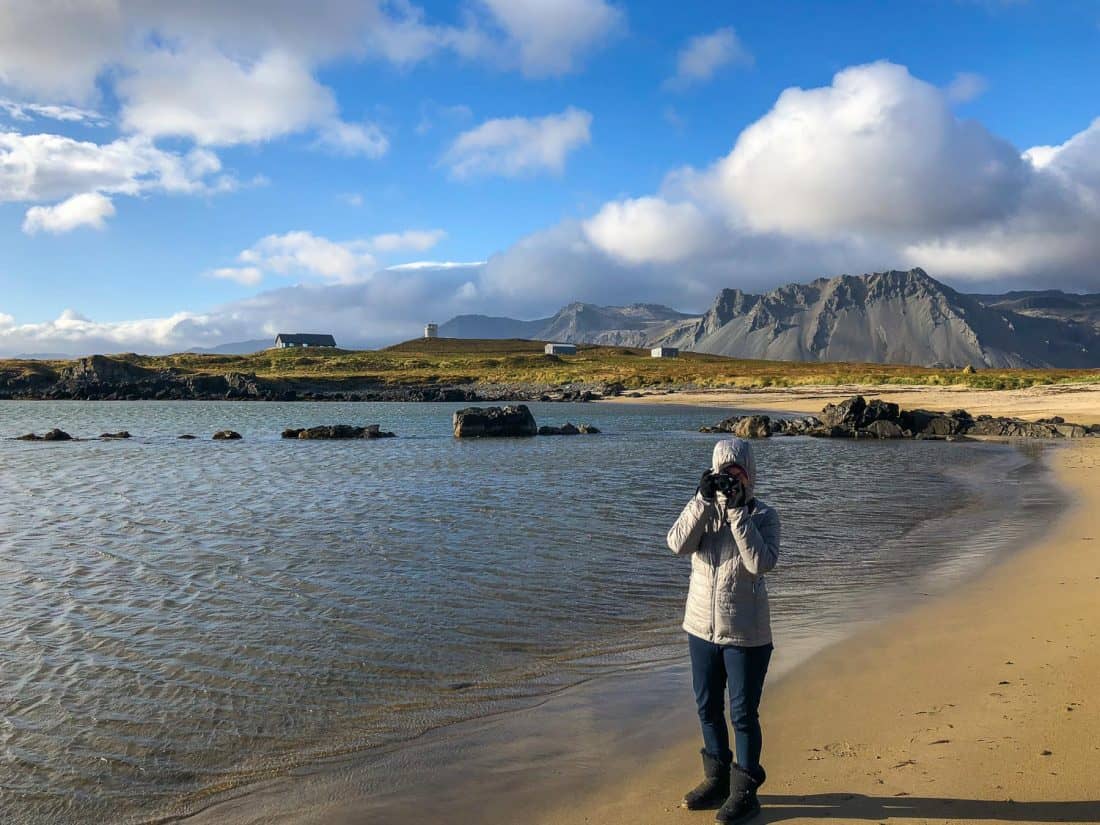
At any time of year in Iceland, you’ll want to pack layers to be prepared for the changeable weather.
See our Iceland packing list for what to pack for Iceland in September.
Other essential items are waterproof hiking shoes or boots, a waterproof jacket (and ideally trousers), a swimsuit for the many hot springs and warm swimming pools, and sunglasses (the sun is often low).
On a typical day, I wore a long sleeve base layer (Icebreaker merino is best), sweater (or two), fleece, lightweight Patagonia down jacket, thermal leggings under jeans, hat, gloves, thick Smartwool merino wool socks, and waterproof hiking shoes.
Simon usually wore a t-shirt, long sleeve Icebreaker merino wool top, fleece, Mountain Hardwear ultralight down jacket, Bluffworks trousers or jeans, hat, gloves, merino socks, and waterproof hiking shoes.
He often wore waterproof over trousers as extra warmth for his legs (thermal underwear would have been a good addition).
We managed to pack everything we needed in one carry-on backpack each.
Road Conditions and Closures
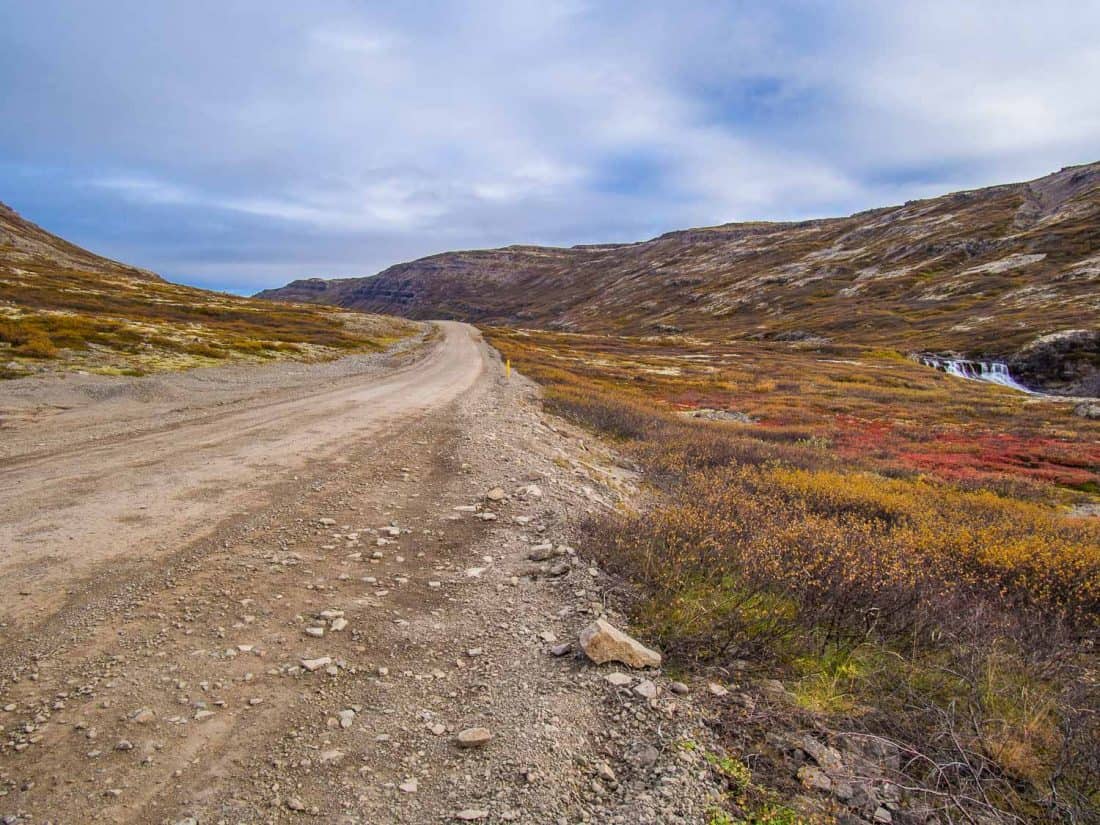
Although winter in Iceland brings guaranteed snow, it also means that roads become impassable or are icy and difficult to drive.
In September almost all roads were open and easily drivable with no ice.
The exception is the uninhabited highlands in the centre of the island which can only be visited in the summer months.
Most first time visitors to Iceland focus on Reykjavik, southern Iceland, or driving the Ring Road around the whole island and these are easily visited in September.
It’s also the last month to safely visit the Westfjords (which we highly recommend) as in October some roads start to close after snow.
It’s important to check Road.is for road conditions every day in Iceland before setting out.
Do you need a 4WD in September? Technically no, as the roads should be clear. We decided to rent a 4WD, though, as we travelled to the Westfjords which has a lot of rough gravel roads.
If your budget allows, a 4WD is worth it if you are venturing far from Reykjavik for added comfort and security. If not, drive carefully and slowly, and a 2WD should be fine.
We use Booking.com Car Rentals to find the best deals.
Reduced Crowds
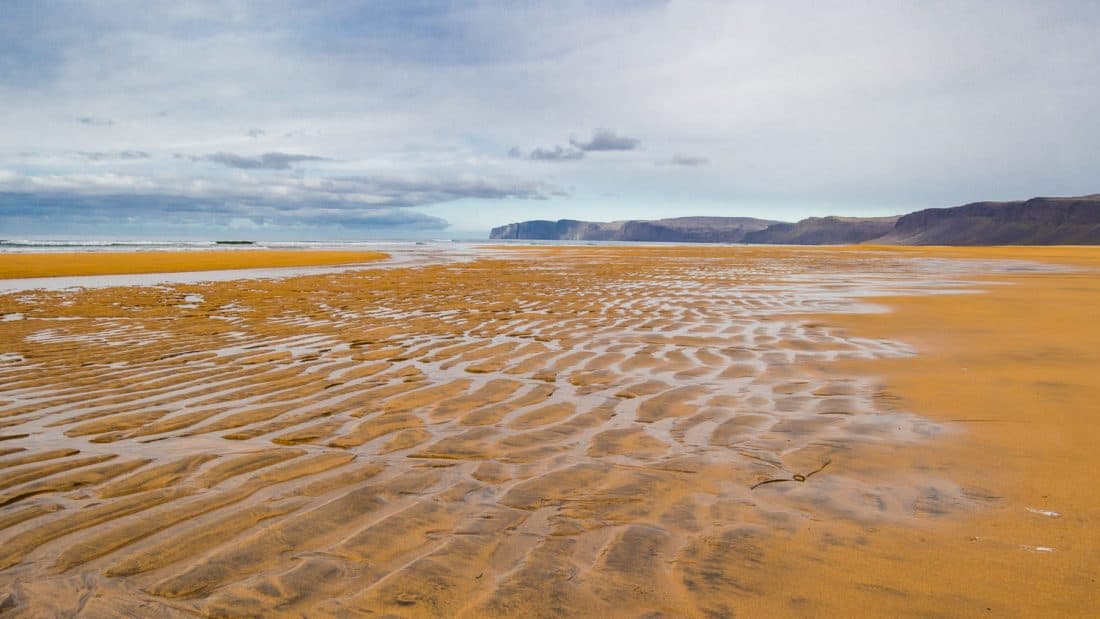
Iceland has become hugely popular in recent years and the busiest months are in the summer, especially July and August when Icelanders also go on holiday.
In summer you’ll need to book accommodation far in advance, prices are higher, and attractions are crowded.
September sees lower crowds and prices and you can find last-minute accommodation—we booked three weeks in advance.
I recommend using Booking to find hotels and cabins and Vrbo for cabins and other self-catering accommodation.
Popular attractions like the Blue Lagoon and Golden Circle will still be crowded, but not as bad as in the summer.
We created an off-the-beaten-track Iceland itinerary and never found the crowds overwhelming.
Opening Hours
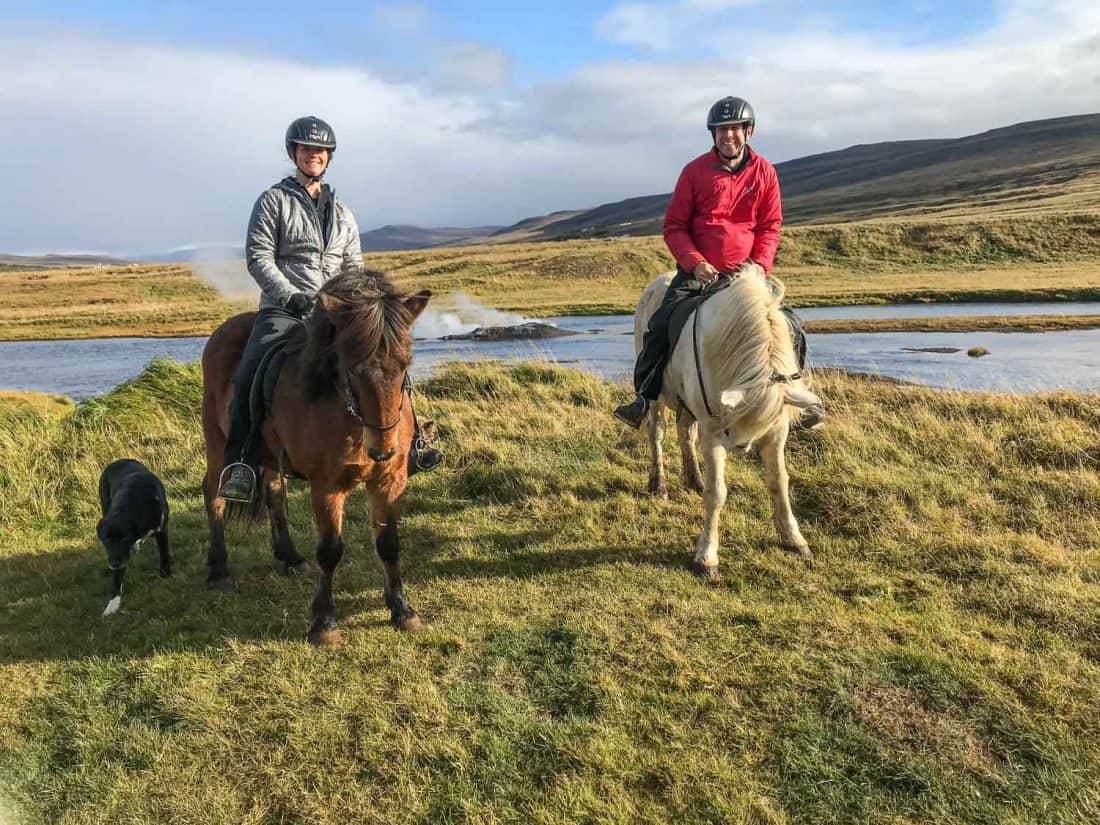
The biggest downside of travelling in Iceland in September is that some museums, cafes, and tourist activities (like horse riding) are closed outside of the June to August summer months.
This only really affected us in the remote Westfjords area (and to a lesser extent in the Snæfellsnes Peninsula) which sees fewer visitors.
Cafes and attractions in the more visited areas of Iceland near Reykjavik will still be open.
For example, we couldn’t find a riding stable open near Ísafjörður in the Westfjords, so we went to Sturlureykir Horse Farm near Husafell on our way back to Reykjavik instead.
I wouldn’t let this stop you visiting Iceland in September, but it is something to be aware of when planning your trip.
That great sounding cafe in a remote location will likely only be open in the summer, so pack lunch instead.
Wildlife in September
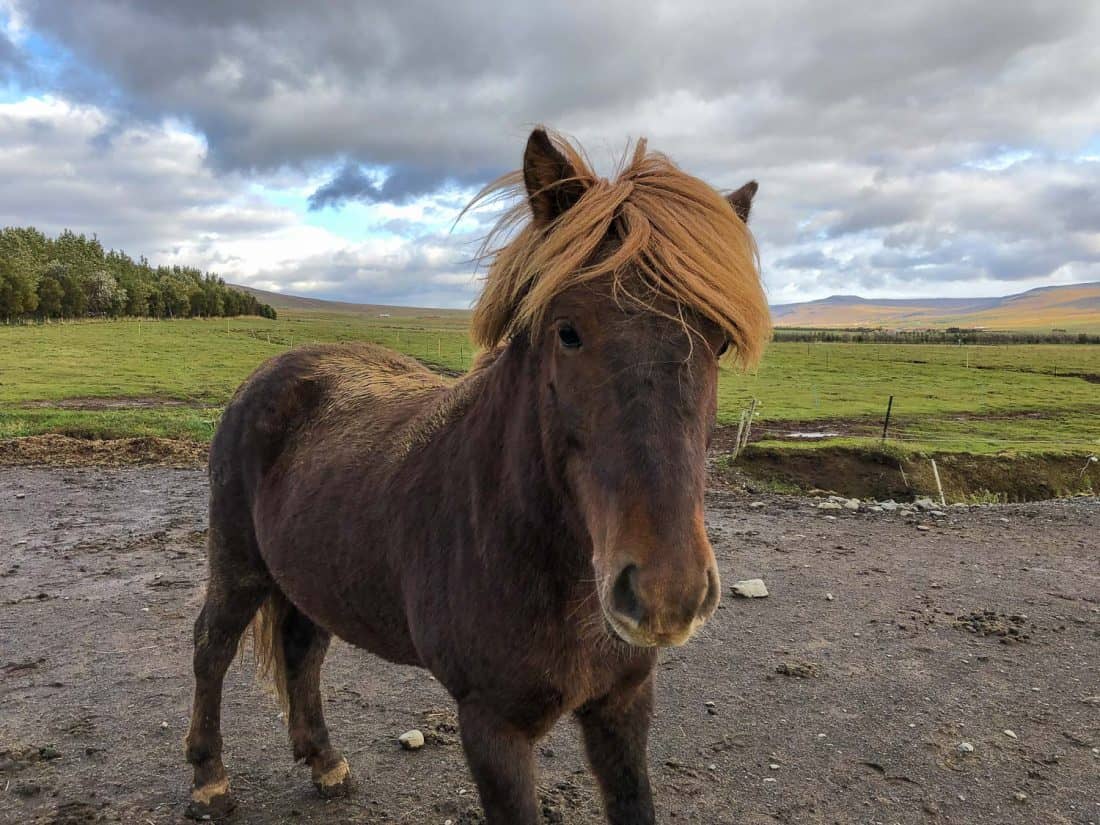
September is not the best time to visit Iceland for wildlife viewing.
On the plus side we saw seals on multiple occasions (at Ytri Tunga beach on the Snæfellsnes Peninsula and in the Westfjords), an Arctic fox at Látrabjarg cliffs (a rare sight!), and many horses and sheep.
But it’s the wrong time of year for many animals. The best time to see whales in Iceland is from June to August and the puffin season is from April/May until August.
We went to the Látrabjarg cliffs in the Westfjords, which are famous for a huge bird colony (including puffins), but at the end of September we didn’t see a single bird.
The best place to see Arctic foxes is the remote Hornstrandir, but ferries only run there in the summer. You can take a tour in September but they are very expensive.
Things to Do in Iceland in September
There are plenty of things to do in Iceland in September. Here are some of our favourites:
Drive the Snæfellsnes Peninsula
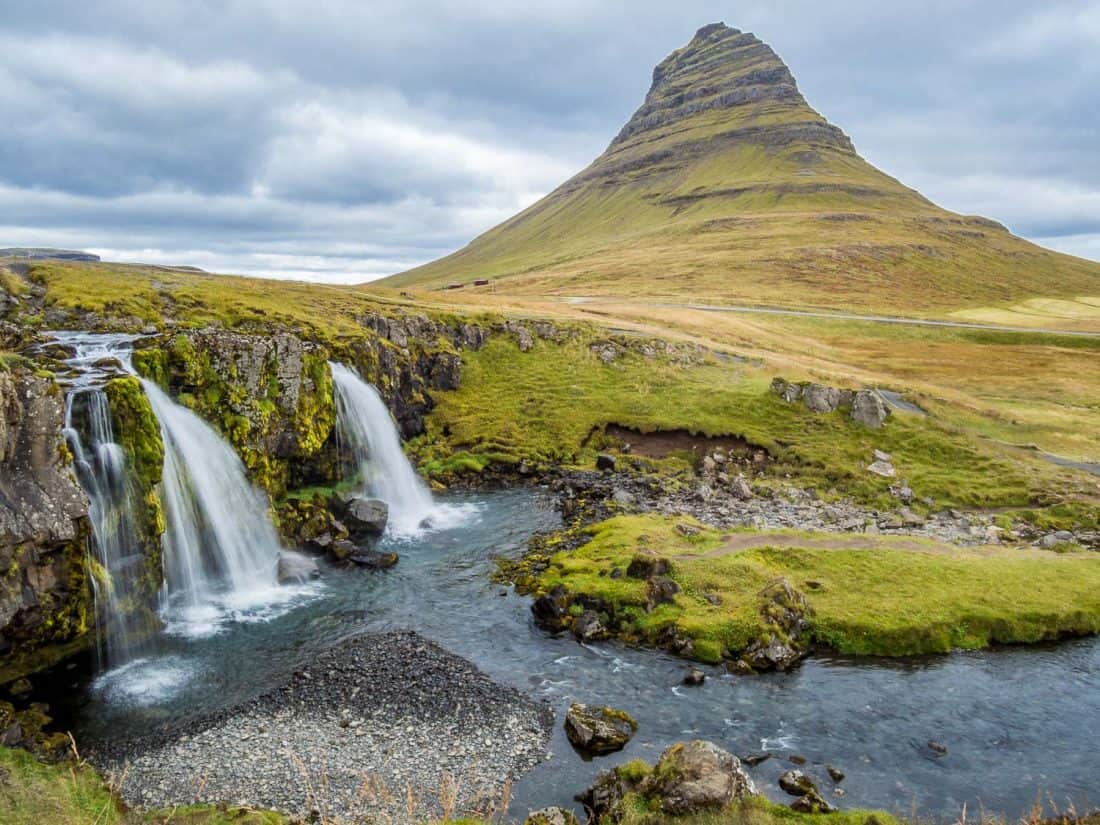
There is so much to see on this gorgeous peninsula just two hours from Reykjavik including volcanic craters, lava fields, a glacier, waterfalls, fjords, hot springs, black and golden sand beaches, and cute fishing villages.
We loved seeing the first snow appear on the mountains at the end of September.
You can self-drive as we did or take a tour from Reykjavik. Although it’s possible to see the highlights in a day, I highly recommend spending a couple of nights in the area as there’s so much to see.
See our picks of the best places to visit on the Snæfellsnes Peninsula.
Hraunfossar Waterfall
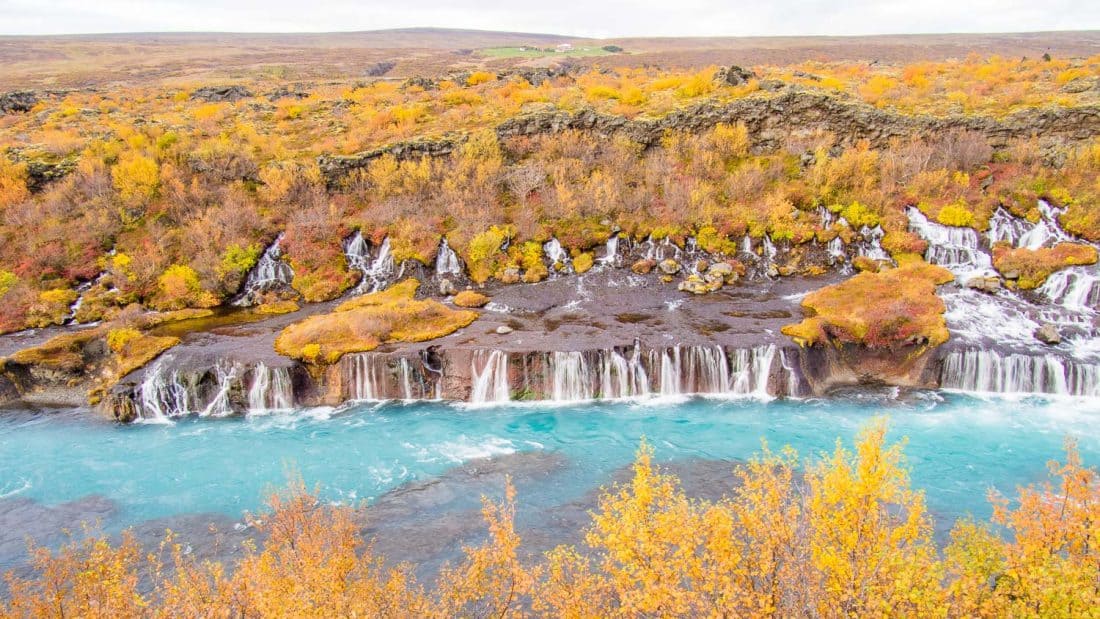
Hraunfossar waterfall is especially beautiful in the autumn when the bushes above it turn shades of orange.
It’s a wide rather than tall waterfall with lots of small falls gushing into the turquoise river below. You can walk to various viewpoints and to the neighbouring waterfall Barnafoss.
It’s near Husafell which is a good base for trips to the Langjökull glacier, and there are more trees in this area than most parts of Iceland so you can enjoy the autumn foliage.
Snowmobiling and Ice Cave on Langjökull Glacier
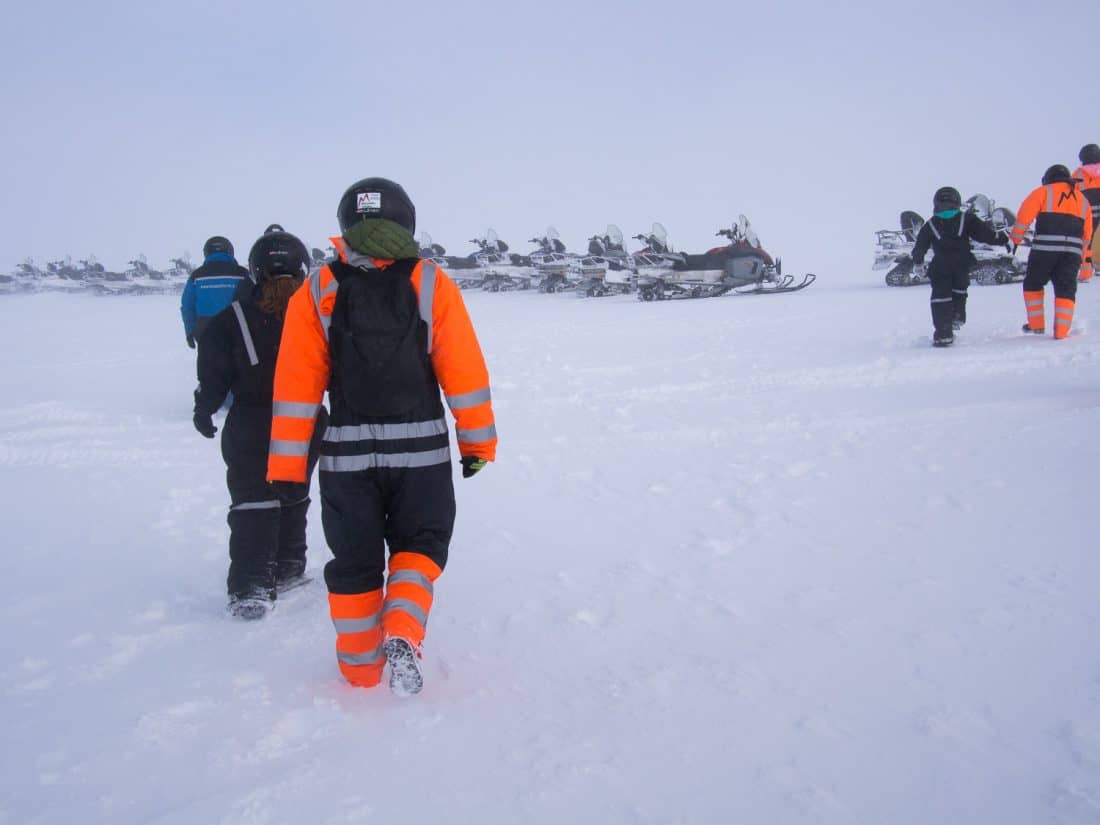
Snowmobiling can be done year-round on Langjökull Glacier, but September is better than the summer as snow will already have started falling.
It was snowing while we were up there and we enjoyed having a true wintery experience.
September is too early for the natural ice caves, but you can visit the humanmade ice tunnels at Into the Glacier.
We did an ice caves and snowmobile trip with Mountaineers of Iceland. It was fun but pricey and crowded, so you could skip it if your budget is tight.
You can also book the Langjökull Glacier Ice Cave Tour and Glacier Snowmobile Tour separately.
Northern Lights
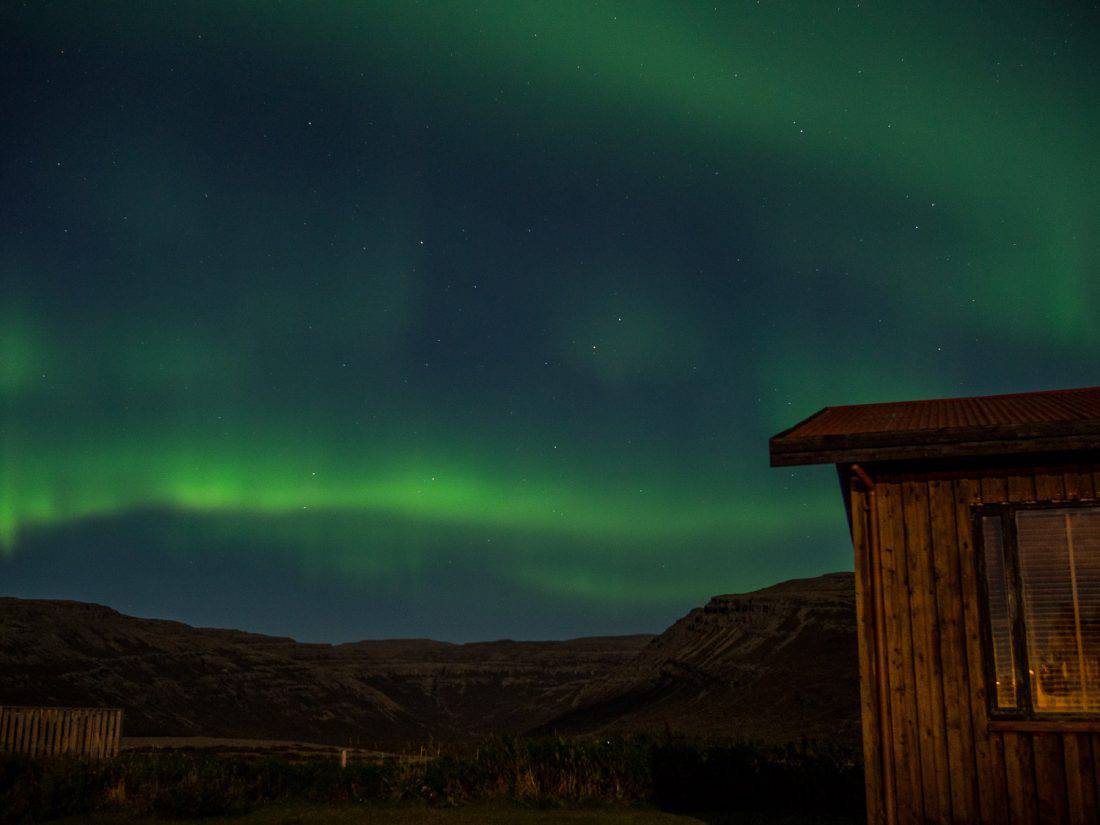
One of the most exciting things about travelling to Iceland in September is the chance to see the northern lights.
You need to get away from light pollution, so you can take a northern lights tour from Reykjavik or stay in the countryside.
We saw the aurora from our Bjarkaholt cabin in the Westfjords.
Westfjords
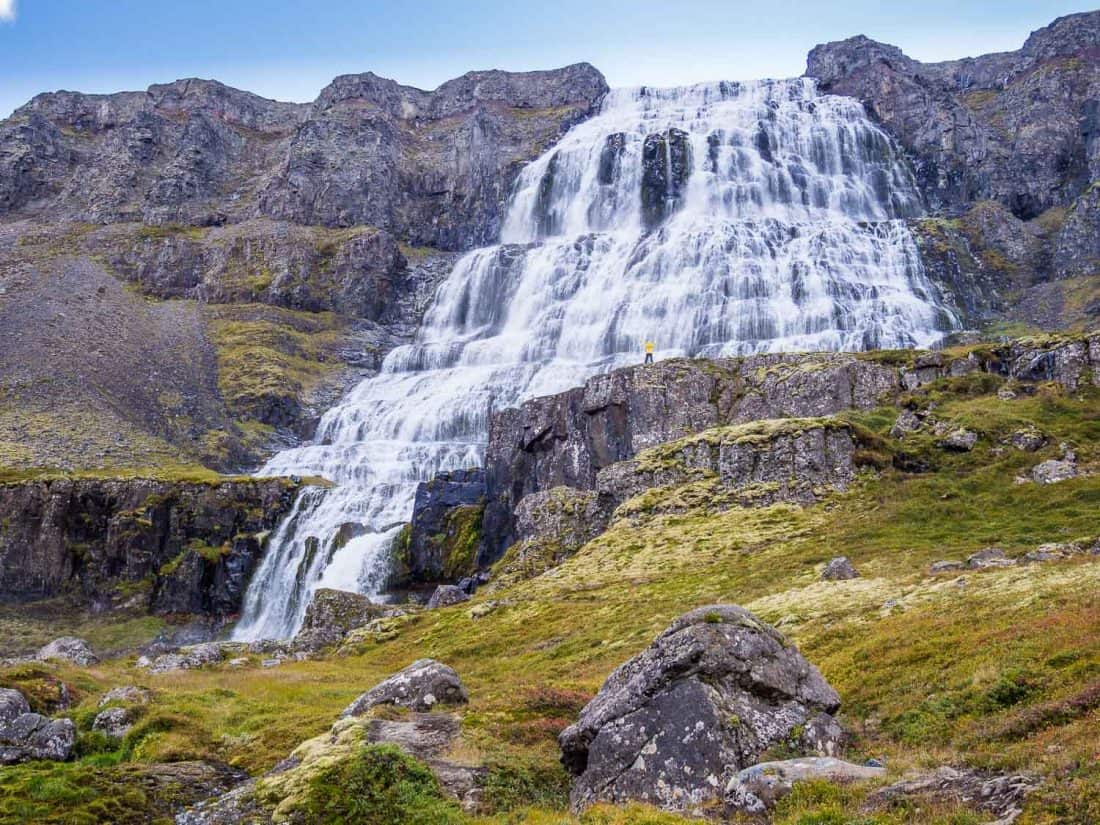
The remote Westfjords in the far northwest of Iceland is best visited before snow closes the mountain passes.
September is ideal as roads should be clear but it’s quieter than the summer months (although some cafes and attractions are closed).
Highlights include Dynjandi waterfall (my favourite in Iceland), Rauðasandur red sand beach, the isolated Strandir Coast, and the cute town of Ísafjörður.
See our Iceland itinerary for details on where we visited in the Westfjords.
Hot Springs and Outdoor Pools
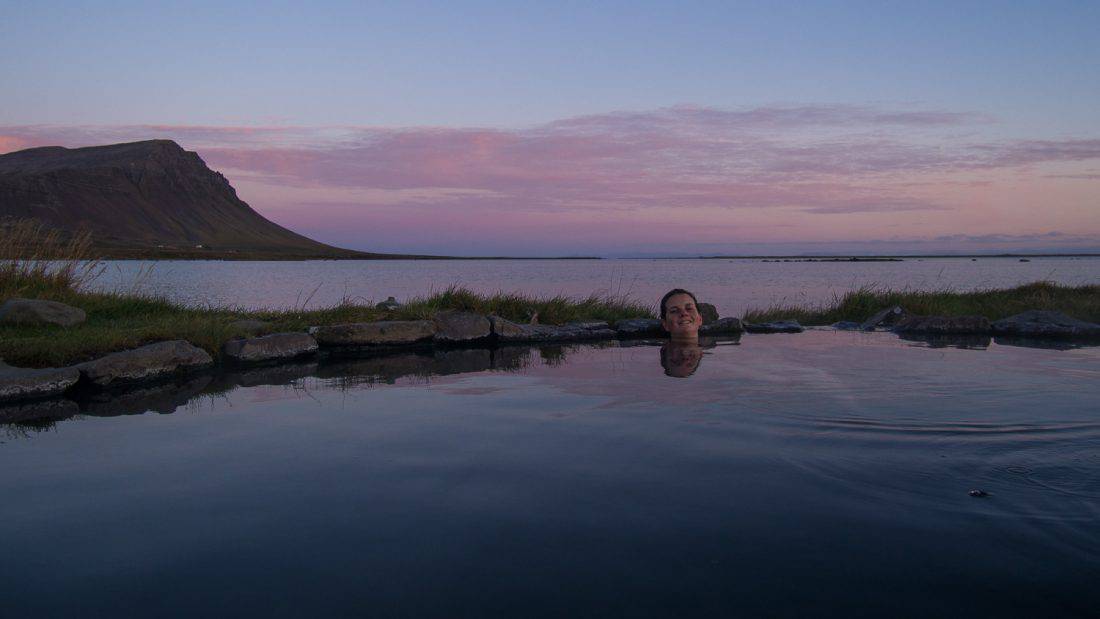
September is cold enough that you’ll really appreciate a soak in a hot spring.
There are many springs and pools all over Iceland. The Blue Lagoon is the most famous, but it’s busy, expensive, and must be booked in advance.
We preferred quieter experiences in the Westfjords where we enjoyed the sunset while relaxing in a hot pot overlooking the sea at Birkimelur Swimming Pool.
Another highlight was swimming in Krossneslaug, an outdoor geothermal swimming pool overlooking the sea.
In September we had it entirely to ourselves and felt like we’d reached the end of the world as we looked out over the waves crashing onto the pebble beach below.
Swimming in a warm pool when it’s cold outside was surprisingly wonderful—don’t miss it!
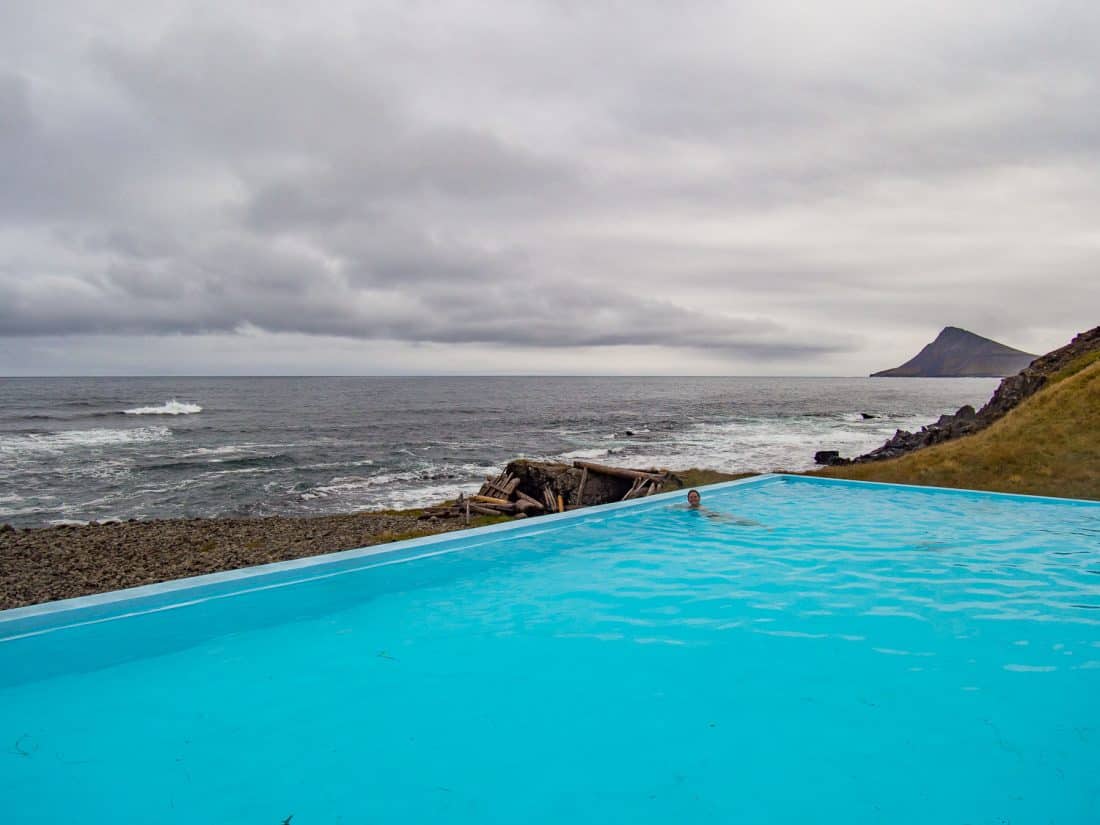
Horse Riding
Icelandic horses are strong and adorable and have a unique smooth gait. Although a few stables close outside the summer, you’ll still have plenty to choose from in September.
We rode at the family-run Sturlureykir Horse Farm near Husafell. The Snæfellsnes Peninsula is another good area where you can ride on black sand beaches and through lava fields.
Go to a Festival
There are a number of festivals and events that take place in Iceland in September, mainly in Reykjavík, some just outside.
Here are a few if you find yourself in the capital at the right time:
- Reykjavík International Film Festival – Takes place in late September each year. In 2024 the dates are 26 September to 6 October.
- The Night of Lights Festival – A family-friendly festival held at the start of September in Reykjanesbær (not too far from Reykjavík) that celebrates the best of local art and music.
- Reykjavik Jazz Festival – Sometimes held at the end of August or the start of September, performances are held in a variety of venues including parks and record stores.
- Extreme Chill Festival – A long-running music festival that celebrates experimental music and visual arts showcasing both Icelandic and international artists.
- Réttir Sheep Round-Up – Perhaps the most Icelandic of all annual traditions, where sheep are gathered en masse back home for Winter. Everyone can participate, and it is always followed by food and festivities.
Visiting Iceland in September Map
Is September a Good Time to Visit Iceland?
I would visit Iceland at any time of year, but September is an especially wonderful time to visit.
It is the perfect mix of summer and winter, lower prices and crowds, and the chance to see the magical northern lights.
What’s your favourite time of year to visit Iceland?
More Iceland Tips
Read our other Iceland posts to help you plan your trip:
- Planning a Trip to Iceland: DOs and DON’Ts
- Iceland Itinerary: Off The Beaten Path on a Snæfellsnes and Westfjords Road Trip
- The Ultimate Iceland Packing List for Men and Women (Carry-On Only)
- 14 Places Not to Miss on the Snaefellsnes Peninsula
- How Much Does an Iceland Trip Cost? Our Road Trip Budget
- 10 Best Books About Iceland to Read Before You Visit
Enjoyed this post? Pin it!
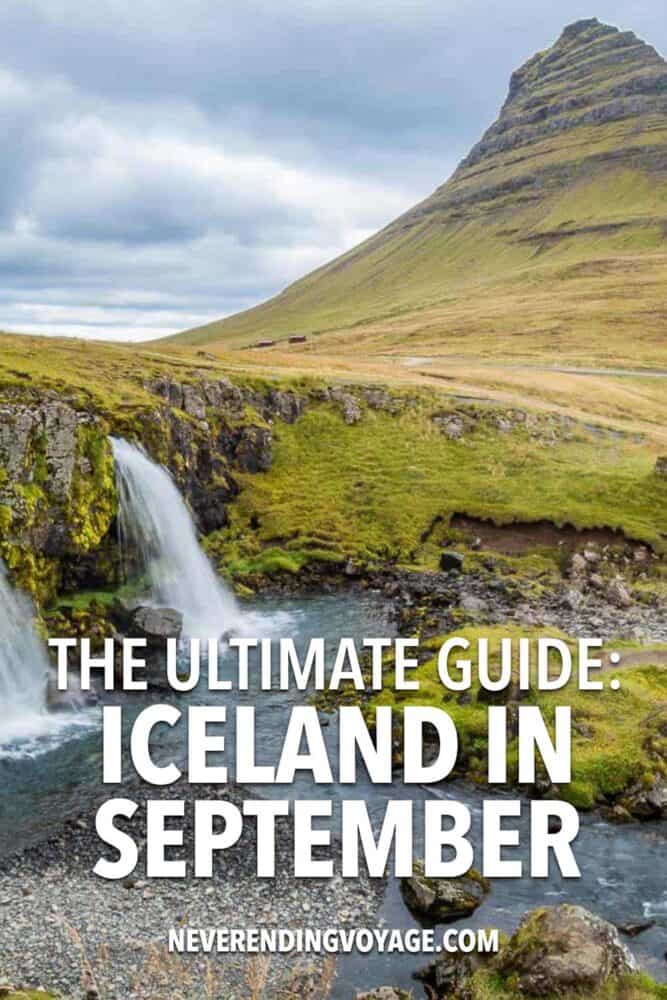
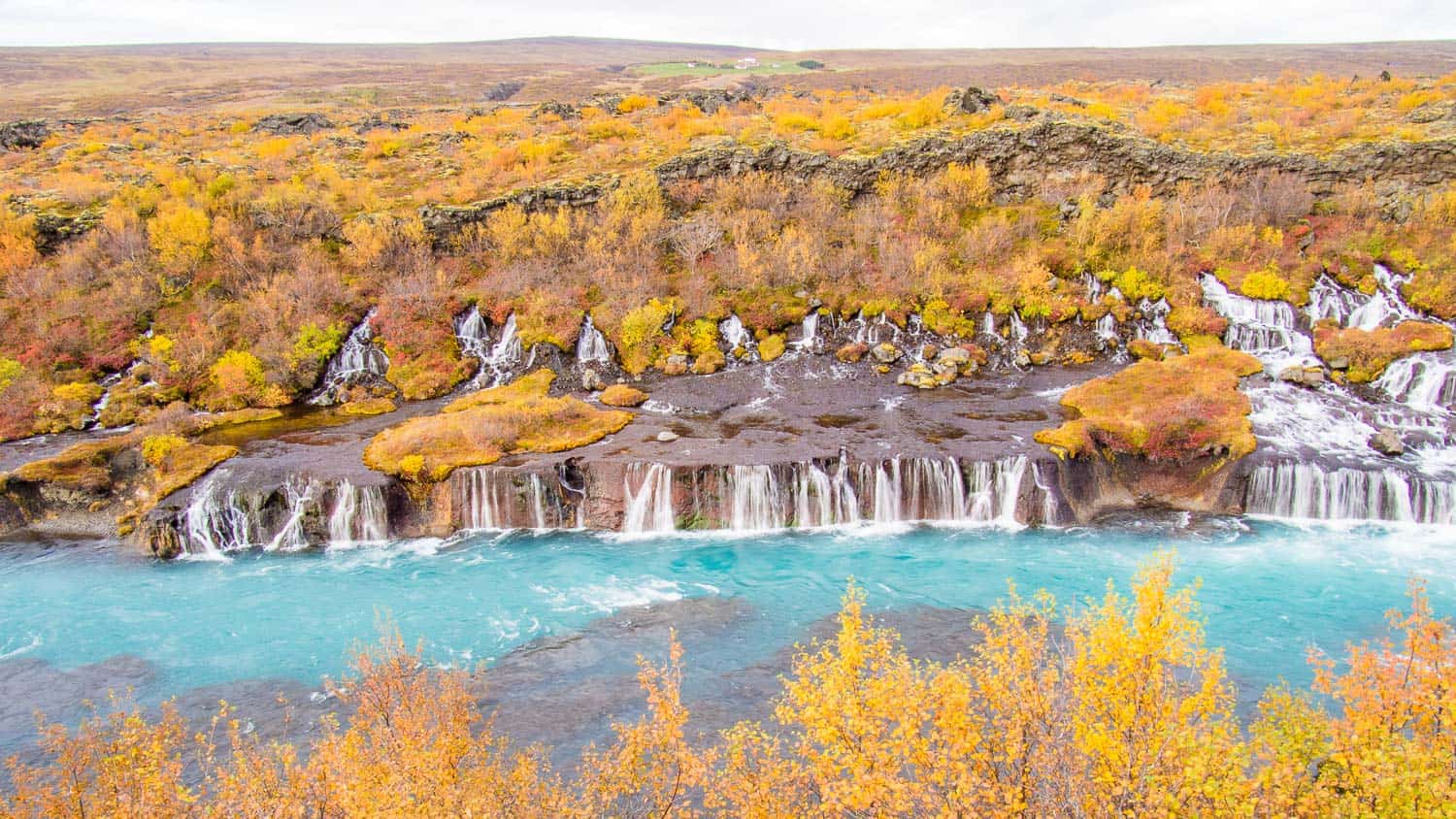
Hi Erin,
Great info, stunning photos and I like that you are providing information for the month of September as it is not easy to find the information of what is open and closed. We are thinking of going for 2 weeks. We hope to visit Reykjavik, Snaefallus Peninsula, hopefully Westfjords, Highlands and the region southeast of the island. How many days so you recommend in each area and where should we base ourselves? Thank you!
Hi Bonnie, you can see our itinerary for Snaefellsnes, Westfjords and Reykjavik here: https://www.neverendingvoyage.com/iceland-itinerary/
With 2 weeks you should be able to add on a few days in the southeast. Note that the Highlands might be closed in September due to snowy roads so you may want to skip them this time.
Enjoy Iceland! Erin
Sorry if I missed it. How many days do you recomeend to stay in Iceland?
Thank you.
I’d say at least 5 days and ideally 1 – 2 weeks. I go into more detail in our Planning a Trip to Iceland post.
You did not mention the Sheep roundup Rettir in September?
Quite a nice experience, we are visiting Iceland coming September and we are looking forward to taking part in this event.
Great article – we are off to Iceland this September !
Hello Erin,
Good to see an article only for people who want to visit in September. Amazing.
Can you guide me if I can do a glacier hike in September?
Yes, you can!
Hello Erin, I love this article. I always read anything about Iceland cause its one of my must travel places in the future. Is September the best month to visit?
September is a great month to visit if you want to avoid the crowds but not deal with the lack of light and snowy roads in winter.
Great information,I assume you are Australian, who did you fly with???How many stops did you do
Absolutely beautiful pictures! Top of my list is really getting out in nature so seeing the Northern Lights, swimming in hot springs and seeing the waterfalls would top my list. Thank you for all the information! I might just have to move Iceland to the top of my destination list!
Wow! looks stunning. Had no clue that Iceland could actually look like this. Loved it.